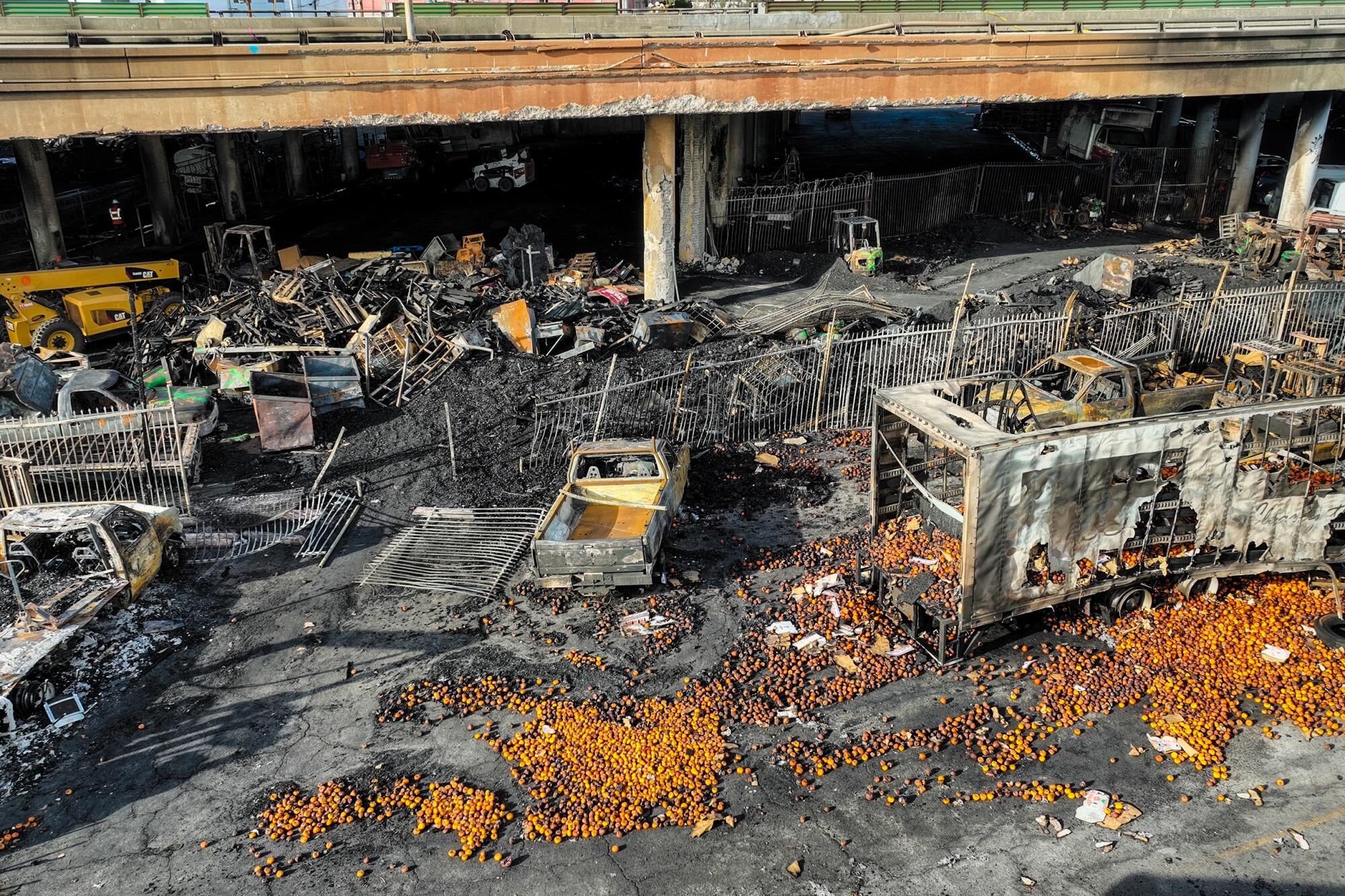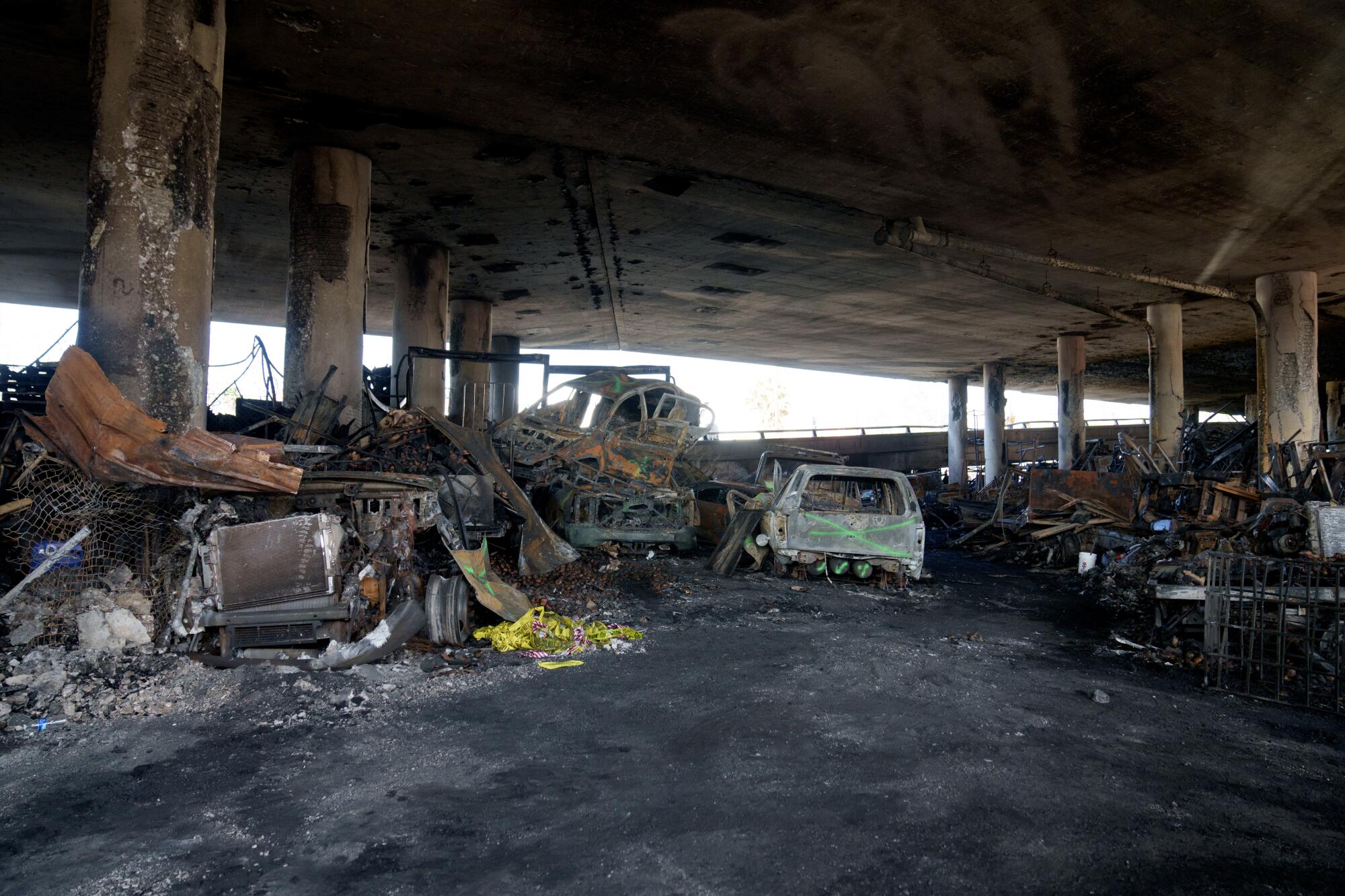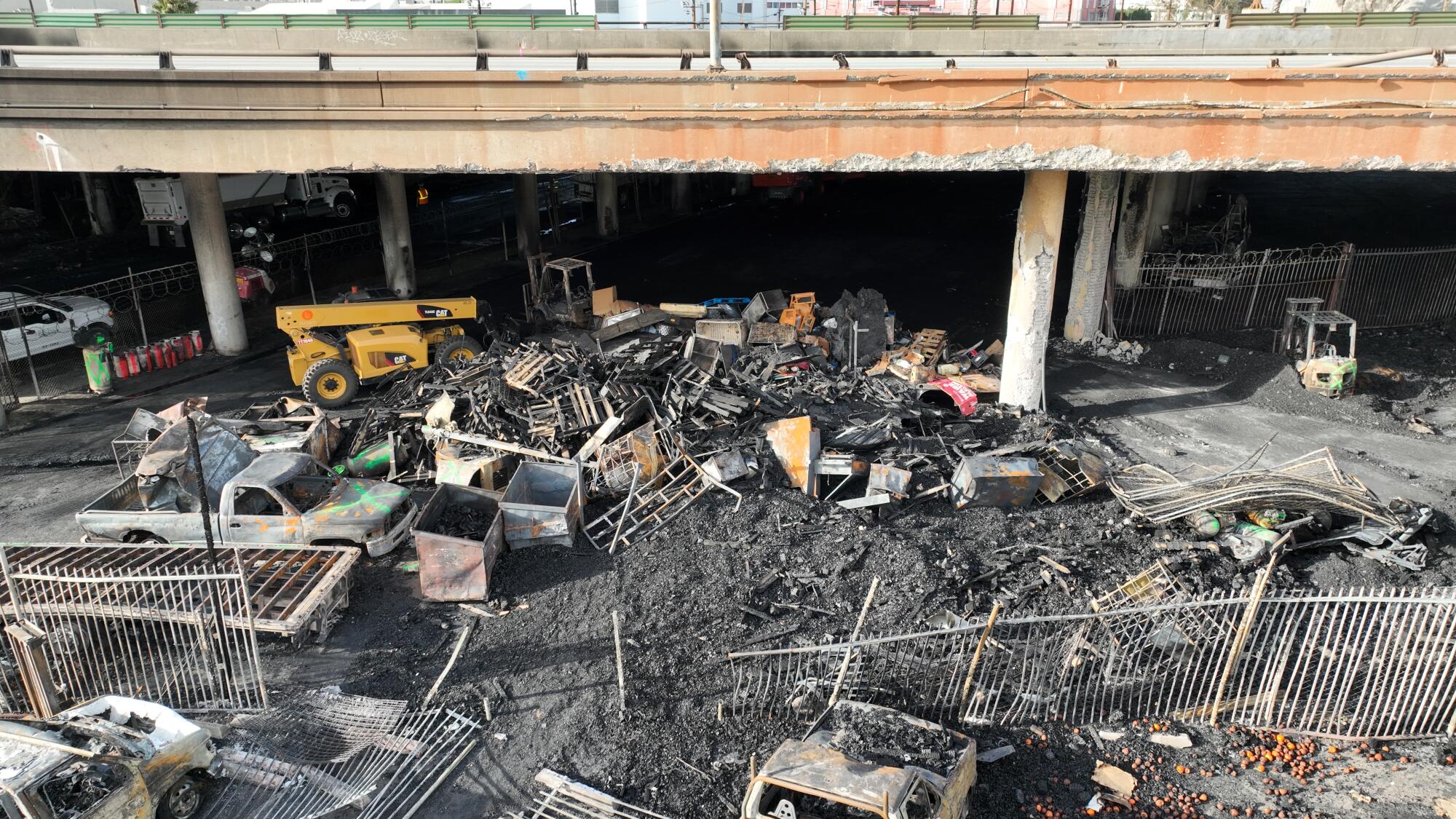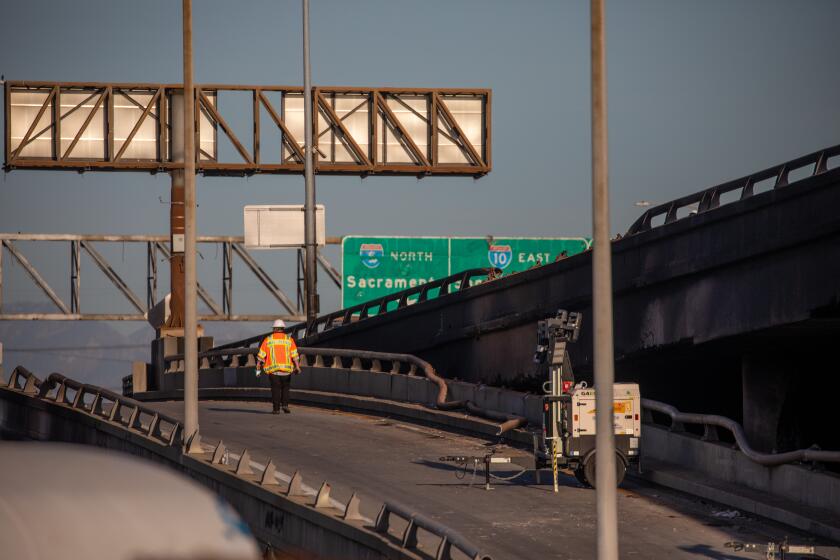
- Share via
For more than a decade, Rudy Serafin showed up to his makeshift office underneath the 10 Freeway as the sun came out and the roar of the morning commute shook the ground below his feet.
With a generator, his cellphone and a portable toilet, the 49-year-old immigrant from Michoacán, Mexico, worked alongside a dozen others operating small businesses in spaces they rented between the concrete columns holding up the interstate. They were mechanics, truckers, garment suppliers, recyclers and pallet distributors, struggling to get by in the region’s economy. They paid rent to a Calabasas businessman who leased the land from Caltrans and, according to court records filed by the agency, illegally sublet it to them at far higher rates.
On Saturday, many of the renters’ dreams went up in the pallet-fueled inferno that caused such severe damage to the freeway that it is expected to be closed for weeks.
While officials say the cause of the fire was arson, many who worked there, with no fire alarms or sprinklers, say it was a disaster years in the making.

“I lost everything,” Serafin said. “We are not educated people. Most of the people are people that crossed the border, work hard, or maybe grew up here. But we are working-class people. We break our back to barely make a good living.”
Serafin sold hangers, elastic and wiring to the garment industry, and had been trying to unload the half a pallet of hand sanitizer that helped fuel the flames.
Their landlord, Apex, owned by Ahmad Anthony Nowaid, had failed to pay rent on the 48,000-square-foot triangular lot at South Alameda and East 14th streets for more than a year, and owed $78,000, according to Caltrans, which sued the company for back rent in September.
The property was one of five that Caltrans was attempting to evict Apex and another Nowaid company from, including a plot along the 5 Freeway in Sun Valley and another a block away from the fire. All told, Nowaid owed about $620,000 to Caltrans in unpaid rent as of September, the agency said in court filings.
Caltrans alleges that Nowaid’s firm secured leases of government-owned property with a host of restrictions, then turned around and broke the leases by illegally subletting to various businesses, including a tow company, a recycling firm, mechanics, a tree-trimming outfit and a trucking firm.
The lease for the land where the fire occurred said the property could be used only for parking operable vehicles and “open storage”; other uses required the approval of Caltrans and the Federal Highway Administration, something the company does not appear to have secured. Nor was Apex supposed to allow the storage of inoperable vehicles, flammable materials or other hazards.
Photos of the lot show a hodgepodge of equipment, vehicles, shipping containers, stacks of cardboard and wood pallets around 15-20 feet high.
For 14 years, Serafin had rented about 10,000 square feet, one of about 11 slots on the parcel that Nowaid sublet to small-business operators, he said, most of them immigrants.
The triangular tract was chaotic, with no clear entrance or address, and with unhoused people living in tents and trailers outside its gates. Graffiti was scrawled around the perimeter. Inside, workers and equipment shared close quarters amid the stacks of pallets.
Traffic in Los Angeles has been surprisingly manageable since fire closed a stretch of the 10 Freeway, officials said.
Serafin said fires regularly broke out in encampments around the property, but calls to police or for cleanups often went unheeded.
He and others would sometimes pay homeless people $20 just to move away from their businesses.
While Caltrans required Apex to hold $5 million in liability insurance, fire insurance was specifically omitted from the lease agreement, according to a copy of the agreement filed in court.
Most of the businesses didn’t have insurance and lost all of their inventory and equipment.
Interviews with more than half a dozen tenants and court records offer a window into life under the freeway at the edges of downtown Los Angeles, where there was little enforcement and an underground economy flourished.
“We’re living paycheck to paycheck,” said Jose Luis Villamil Rodriguez, 53, who had a mechanic stand under the freeway.

He estimates he lost $100,000 worth of tools, trucks and equipment, including a 1970 GMC Camper he had just fixed for $20,000. He now has to return the first installment of that payment to his client.
“This can’t be true; I hope it isn’t true, but if it is —” he told himself as he drove to the shop on the night of the fire. “I guess I’ll be OK. But I’ve sacrificed so much for it to end up like this?”
Rodriguez, who is Oaxacan, came to the U.S. from Mexico at 19. He worked on cars using a generator for light and a portable air compressor to power his tools. He paid Nowaid’s company $1,450 a month for the space. He had no insurance.
Now it was all in ashes. The concrete columns were cracked and charred.
Gov. Gavin Newsom was promising to “fix the 10.” What Rodriguez wanted was his business back, as did Serafin.
Serafin had hung a colorful sign between two freeway pillars advertising his distribution service that catered to the garment district. Over the years, his business grew, and he was able to support his wife and four children after paying $4,500 a month to one of Nowaid’s companies. He estimates that, collectively, tenants there paid about $23,500 a month.
Rodriguez said the owner was relentless when it came to collecting rents. “I had to pay by the first of the month,” he said. “There was not much wiggle room.”
Alfredo Lara, 54, another tenant, said his rent was $4,000 a month, which was so much that he began subleasing a portion of his space to three other people for $1,000.
Apex, meanwhile, was supposed to be paying Caltrans $6,518 a month to lease the land, a figure that had not changed since about 2015, according to court records. Caltrans began leasing the land to Apex for $5,300 a month in 2008.
After the fire, Serafin said, he got calls from dozens of people checking whether he was OK. He also got a call from Nowaid on Sunday, asking whether the fire was on his property.
Over quail egg shao mai and steamed duck, guests dining in the Chinese restaurant at the new Mediterranean-style Hotel Los Angeles will gaze out over a familiar sight--the traffic-jammed Hollywood Freeway almost within arm’s reach.
“Then he asked if there was an investigation,” Serafin said. “I said yes. Then he hung up.”
Asked about the fire by phone on Monday, Nowaid said he “did not know anything” yet and was consulting with his attorneys.
His lawyer Mainak D’Attaray said he and his client were doing their own investigation of where and how the blaze started.
“It happened so recently that we don’t even know what occurred,” D’Attaray told The Times, later adding in an email that Apex Development “had nothing to do with the fire.”
The relationship between Nowaid and his tenants had long since soured.
In April, court records say, a Caltrans employee visited the lot and told tenants to stop paying their rent to Apex as the state planned to evict the company.
That visit prompted Apex to sue Caltrans in June, accusing the agency of interfering with its businesses, according to court records. Apex also said it had made more than $100,000 in improvements to the property, and that evicting Nowaid’s firm would amount to “unjust enrichment” of Caltrans.
The workers underneath the freeway stopped paying.
“It wasn’t that we didn’t want to pay him,” Serafin said. “We just wanted him to fix it, to pay Caltrans.”
It didn’t work. In June, he said, Nowaid arrived with security in unmarked cars and locked the tall iron rod gates until each of the tenants paid rent.
Nowaid posted a few people at the gates, Serafin said, while the tenants each fetched cashier’s checks from their banks.
“He was trying to get as much money from us as he could,” Serafin said. They continued paying him until October, shortly after state lawyers moved to evict Apex from his five sites.
Several tenants, including Serafin, said they stopped paying Nowaid this month after receiving notice from the court to appear for the lawsuit in December. They said that the moment they stopped paying rent, Nowaid threatened to lock the gates again.
“He sent one of his workers to collect the payment,” said Carina Quinto, who runs a mobile mechanic shop from the underpass. “We told him no, you can’t do that. It’s not legal.”
Normally, she said, he would respond by shutting the gates, but this time nobody ever came to close the doors.
Then came the fire, a little more than a week later.
More to Read
Sign up for Essential California
The most important California stories and recommendations in your inbox every morning.
You may occasionally receive promotional content from the Los Angeles Times.

















